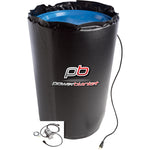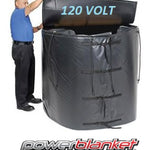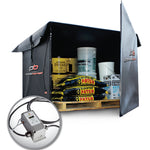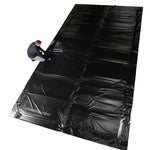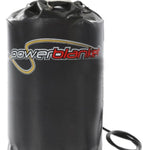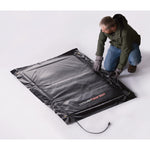You have no items in your shopping cart.
Article At-a-Glance
How Can You Keep Your Horse's Water Trough from Freezing in Winter?
To prevent your horse's water trough from freezing during winter, consider using a heated water trough that utilizes electric heating elements or solar power to maintain water temperatures above freezing, ensuring your horses have consistent access to drinkable water even in subzero conditions.
Key Takeaways
- Choose the Right Heated Trough: Explore options like electric, solar-powered, and insulated troughs with heating elements to keep water unfrozen, each with unique benefits and considerations for your farm setup.
- Ensure Safety and Efficiency: Prioritize models with proper grounding and GFCI outlets to prevent electrical hazards, and regularly inspect components for wear and tear to maintain safe operation.
- Consider Energy Sources: Electric troughs offer quick heating but may incur higher costs, while solar-powered options provide eco-friendly solutions ideal for off-grid locations, though they depend on sunlight availability.
- Optimize Installation: Follow installation guidelines carefully, ensuring durable materials and proper setup to withstand harsh winter conditions and maximize the trough's effectiveness.
- Evaluate Long-term Benefits: Investing in a heated water trough can enhance animal health, improve feed intake, and boost productivity, offering significant returns over time.
Heated Water Trough for Horses: How to Keep Your Horse's Drinking Water from Freezing in the Winter
As winter's icy grip tightens, ensuring your livestock's comfort and well-being takes on special importance. Access to clean, unfrozen water is nearly impossible when water troughs freeze. This is where Heat Authority's custom heating solutions save the day, safeguarding your animals' health and productivity throughout the coldest months.
If you're searching for a tailored solution to manage temperature, turn to Heat Authority. Our team is equipped to handle any custom heating challenge you may face.
Why Unfrozen Water Matters
For all livestock, water is the key to life and productivity. It regulates body temperature, aids digestion, and fuels all vital functions. Winter weather can often deprive livestock of this essential resource, making cold weather detrimental to their health. Frozen water troughs lead to dehydration, decreased feed intake, and lowered immunity, paving the way for illness and even death.
Heated Water Troughs: A Warm Winter Oasis
Animals must have access to drinkable water in the winter as much as they need it in summer. Dairy One Cooperative, a non-profit in North America that helps dairy farmers improve their milking operations, says that “the ideal temperature range for cows when drinking water is 40°F to 65°F. If you are using heaters on pipes or in water sources to keep them open in cold weather, check water temperature on a regular basis to make sure they are working properly.” This is essential when temperatures drop below freezing.
Heated water troughs are game-changers in cold climates, transforming an unintentional ice bath into a warm oasis for your thirsty animals. Unlike heated water buckets for horses that require constant refilling, these innovative systems utilize either electric heating elements or solar power to consistently maintain the water temperature above freezing.
Horses: Where Winter Bites Deepest
Horses are sensitive creatures, and their water needs are unique. They prefer to drink smaller amounts more frequently, and cold water can discourage them from taking in enough. This can lead to colic, kidney problems, and even respiratory issues. Heated water troughs ensure they stay hydrated and comfortable, promoting optimal health and performance.

Beyond Horses and Cattle: Water for All Livestock
Agricultural need for unfrozen, potable water is essential for getting through the cold months of the year. Horses, with their high metabolic rates and unique drinking habits, are particularly vulnerable to the dangers of icy water. Cattle, with their complex digestive systems, rely on consistent water intake for optimal milk production. According to our friends at Oklahoma State University, “Dairy cows given free access to water will produce more milk and more butterfat than cows on a twice-per-day drinking schedule.”
The benefits of heated water troughs extend to all livestock. Sheep and goats, also susceptible to cold stress, find solace in a warm drink that keeps their energy levels up and coats healthy. Poultry thrives on water for egg production and overall well-being, while swine maintain their ideal body temperature and digestion with a steady supply of unfrozen water.

Trough Talk: Exploring Your Options
Many manufacturers offer a diverse range of heating equipment for water troughs to cater to your specific needs and farm setup. Choose from three options: electrically heated troughs, solar-powered troughs, and insulated troughs with heating elements.
Electrical Heated Troughs
Convenient and reliable, electrical heated troughs plug into your existing power grid, offering quick and efficient heating.
Pros:
- Fast and efficient heating: Provide immediate and consistent warmth, ideal for extremely cold regions.
- Easy to install and use: Simply plug into existing power and adjust the thermostat.
- Wide range of sizes and models: Options for various trough sizes and animal needs.
Cons:
- Highest running cost: Relies on electricity, which can be expensive depending on usage and region.
- Safety concerns: Requires proper grounding and GFCI outlet protection to prevent electrical hazards.
- Limited mobility: Ties you to existing power infrastructure, making relocation less convenient.
Solar-powered Troughs
Harness the sun's energy for eco-friendly, sustainable heating. Solar-powered heated troughs are ideal for off-grid locations or farms looking to reduce their carbon footprint.
Pros:
- Environmentally friendly: Uses renewable energy, reducing carbon footprint and operating costs.
- Suitable for off-grid locations: No need for electrical connection, ideal for remote farms.
- Low maintenance: Typically require minimal upkeep compared to electric models.
Cons:
- Reliance on sunlight: Performance depends on sun exposure, less effective in cloudy or short-daylight regions.
- Higher initial cost: Solar panels and battery systems can be more expensive than initial electric trough purchase.
- Lower heating capacity: May not be suitable for extreme cold, as sunshine might be insufficient for consistent warmth.
Insulated Troughs with Heating Elements
Insulated troughs combine insulation with internal heating to create a double layer of protection against the cold, maximizing energy efficiency.
Pros:
- Energy-efficient: Reduces heat loss, resulting in lower energy consumption and operating costs.
- Effective with any material: From galvanized water troughs to plastic totes, insulation and heating elements can warm any type of container.
- Dual functionality: Can be used without the heating element in warmer months if desired.
Cons:
- Multiple pieces of equipment: Requires both insulation and heating element, though some manufacturers such as Powerblanket include heating elements inside the insulation.
- Potential overheating risk: Requires careful thermostat monitoring to avoid scalding water, especially in smaller troughs. Ensure your heating elements come with adjustable thermostat options.
- May be bulky and heavier: Insulation adds to the overall weight and size of the trough.
Not all systems work for every farm setup. A custom trough heating solution can maximize the benefit for your livestock. These considerations should also be taken into account for other agricultural needs, such as heating solutions for honey bees.
Setting the Stage: Installation and Safety Tips
Installing a heated water trough is a breeze, but following safety guidelines is essential. For electric models, prioritize GFCI outlets and proper grounding to prevent electrical hazards. Choose troughs made from durable materials that can withstand harsh weather conditions, and regularly inspect cords and electrical components for wear and tear.
Cost Counts: Savings & Efficiency
While the initial investment in a heated water trough might seem daunting, consider the long-term savings. Improved animal health, optimized feed intake, and increased productivity contribute to a significant return on investment. Additionally, opting for energy-efficient models or solar-powered options further reduces your operating costs.
Prioritize Comfort, Prioritize Health
Winter doesn't have to be a battle for your livestock. By providing them with access to warm, unfrozen water through Heat Authority's innovative heating solutions for water troughs, you invest in their well-being, productivity, and ultimately, the success of your farm. This winter, let the warmth of Heat Authority melt away your worries and ensure your animals thrive, no matter how low the temperature drops.







